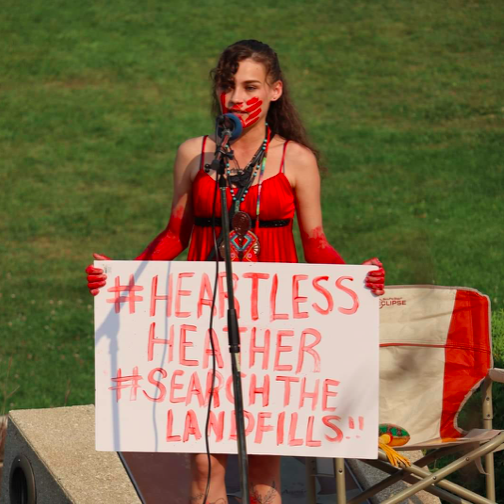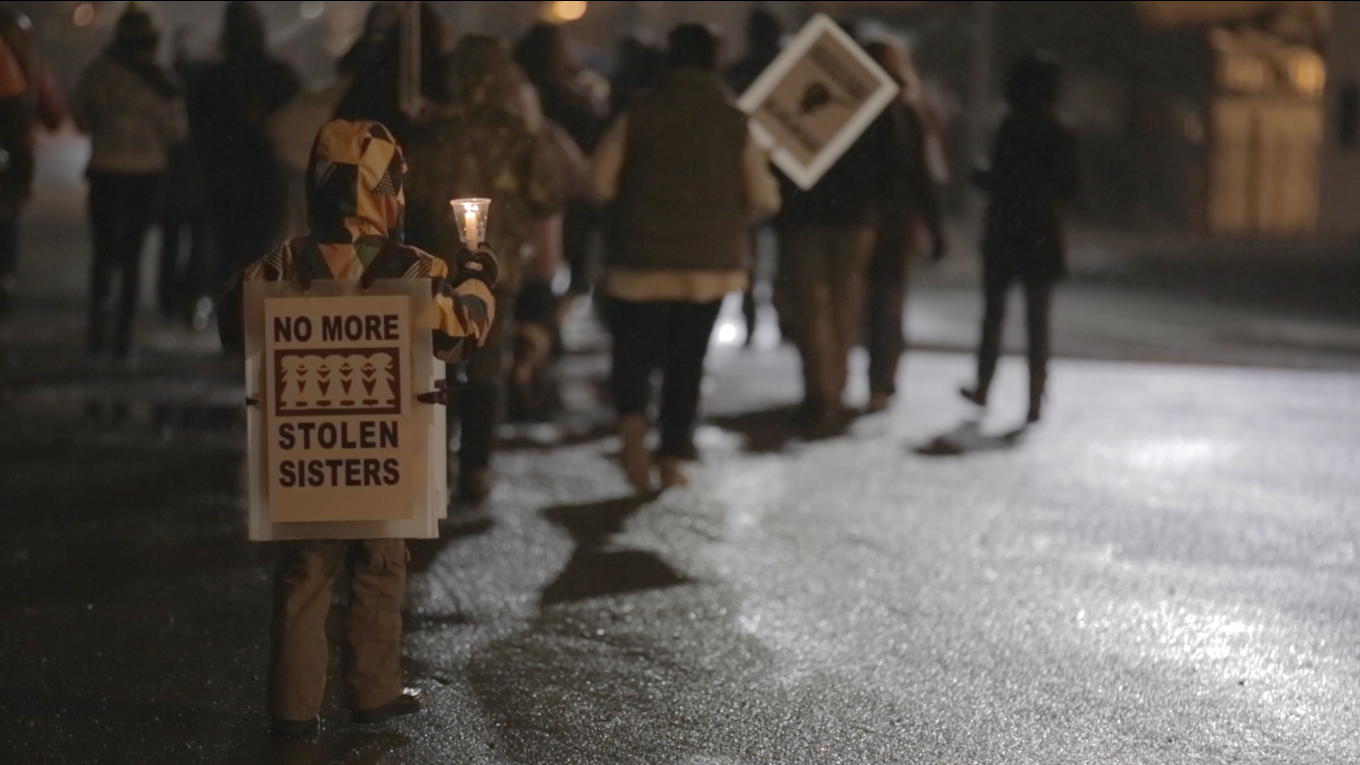Families of Sisters in Spirit and Amnesty International Canada urge the governments of Canada and Manitoba to search for and bring home the remains of Morgan Harris, Marcedes Myran and Mashkode Bizhiki’ikwe, three Indigenous women believed to be buried in two Winnipeg landfills.
With their call to action on Thursday, the two organizations join the families of missing and murdered Indigenous women, girls and 2SLGBTQIA+ people (MMIWG2S+), the Union of BC Indian Chiefs, the Assembly of First Nations, the Assembly of Manitoba Chiefs, and the Federation of Sovereign Indigenous Nations in denouncing Manitoba Premier Heather Stefanson’s refusal to search the Prairie Green and Brady Road landfills for the women.
“No person deserves to be left in a landfill as a final resting place. Not one,” said Bridget Tolley, co-founder of the grassroots organization Families of Sisters in Spirit, which provides support to Indigenous families whose loved ones have gone missing or been murdered.
September 18 declared International Day of Action to Search the Landfills
Amnesty International Canada will participate in a September 18 sit-in on Parliament Hill in Ottawa organized by MMIWG2S+ families, Families of Sisters in Spirit, and other advocates. MMIWG2S+ families and advocates have declared September 18 the International Day of Action to Search the Landfills. “We will be at Parliament Hill on September 18,” Tolley said. “Bring your songs. Bring your drums. Wear red. Bring a red dress. Bring you.”
A Winnipeg-area man faces first-degree murder charges in the deaths of Harris and Myran, both of Long Plain First Nation, and an unidentified woman whom community members are calling Mashkode Bizhiki’ikwe, or “Buffalo Woman.” The man also stands accused of murdering Rebecca Contois, a 24-year-old woman from Crane River First Nation whose body was found in the Brady Road landfill in May 2022. Remains of Linda Mary Beardy, a 33-year-old mother of four from Lake St. Martin First Nation, were retrieved from the landfill in April 2023. As of August 2023, no one has been charged in her death.
“Amnesty International Canada affirms solidarity with the loved ones of Linda Mary Beardy of Lake St. Martin First Nation, Rebecca Contois of Crane River First Nation, Marcedes Myran and Morgan Harris of Long Plain First Nation, and Mashkode Bizhiki’ikwe,” said Ketty Nivyabandi, Secretary General of Amnesty International Canada’s English-speaking section. “Their murders have inflicted unspeakable trauma and grief upon the women’s families and Indigenous Peoples across Canada.”
Manitoba refusal to search the landfills is ‘indefensible’
“Premier Stefanson’s refusal to search the landfills is indefensible and sends the appalling message that the lives of Indigenous women, girls, Two Spirit and gender-diverse people are not valued in Canada,” Nivyabandi added. “The Government of Canada and the Government of Manitoba must prioritize and adequately fund a search of the landfills to return Marcedes, Morgan and Mashkode Bizhiki’ikwe to their loved ones without further delay.”
In early July, Premier Stefanson announced that Manitoba would not move forward with a search of the Brady Road and Prairie Green landfills. She cited “safety risks” as a reason not to meet the demands of the families and advocates. However, forensic experts who conducted an Indigenous-led feasibility study have confirmed that the safety risks associated with searching the landfills can be mitigated.

Dismayed by the province’s decision, MMIWG2S+ families, community members and advocates staged a blockade on the road leading to the Brady Road landfill. Organizers reluctantly agreed to move the blockade on July 18, four days after a judge granted the province’s request for an injunction to dismantle the protest.
Demonstrators in Winnipeg set up a new camp beside the Canadian Museum of Human Rights, near The Forks. Naming the new site “Camp Marcedes” in memory of Marcedes Myran, MMIWG2S+ families and advocates persist in their calls for justice for Myran, Harris, Mashkode Bizhiki’ikwe, Contois, Beardy, and other missing and murdered loved one
Families of Sisters in Spirit and Amnesty International Canada said that while authorities must move ahead with searching the landfills, Ottawa must also do more to end racism, egregious violence, and systemic and institutionalized abuse towards Indigenous women, girls and 2SLGBTQIA+ people.
Amnesty International Canada, in its Submission to the 44th session of the Universal Periodic Review (UPR) of Canada to the UPR Working Group, highlighted that while Canada’s 2021 launch of the National Action Plan: Ending Violence Against Indigenous Women, Girls and 2SLGBTQQIA+ People was commendable, violence against Indigenous women, girls, Two Spirit and gender-diverse people continues. In addition, police investigations are often marred by anti-Indigenous racism, discrimination and abuse. The federal government’s 2022 Progress Report on the National Action Plan revealed little progress.
During his visit to Canada in March 2023, the UN’s Special Rapporteur on the Rights of Indigenous Peoples, Francisco Cali-Tzay, expressed his deep concern over the reports and testimonies concerning missing and murdered Indigenous women, girls, Two Spirit and gender-diverse people across Canada. Calí-Tzay affirmed that Canada’s MMIWG2S+ National Action Plan and Federal Pathway investment of over $2.2 billion were not enough to tackle the crisis.
National action strategy needed to protect Indigenous women, girls and 2SLGBTQIA+ people
Families of Sisters in Spirit and Amnesty International Canada therefore call on the Government of Canada to create a time-bound, Indigenous-led, trauma informed, culturally sensitive and distinctions-based National Action Plan Implementation Strategy. The Implementation Strategy must outline how all 231 Calls for Justice in the Final Report of the National Inquiry into Missing and Murdered Indigenous Women and Girls will be implemented to end violence against Indigenous women, girls and 2SLGBTQIA+ people.
“We remain firm in our ongoing support to Nations, Métis peoples and the Inuit in their demands for the full and meaningful implementation of the United Nations Declaration on the Rights of Indigenous Peoples and the 231 Calls for Justice,” Nivyabandi said. “Indigenous People’s rights – and the lives and murders of these beloved women and girls, who were stolen from their families because of anti-Indigenous racism, colonial violence, hatred and misogyny – must not be ignored.”
Header photo credit: (c)Amnesty International






















